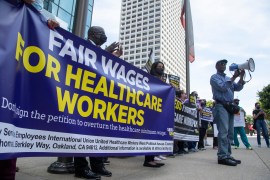Good morning!
Los Angeles Times: Lawmakers Reach Tentative Deal To Extend Payroll Tax Break
Despite discomfort in the Republican ranks, House and Senate negotiators reached a deal in principle early Thursday to extend a payroll tax break, continue unemployment benefits and ensure that Medicare doctors do not get a pay cut this year. … One of the issues holding up the agreement late Wednesday was Republicans’ insistence on a provision allowing Medicare to pay for services at newly built doctor-owned hospitals. Under the nation’s new healthcare law, such hospitals would no longer be reimbursed because their services were deemed too costly (Mascaro, 2/16).
The Washington Post: Congressional Negotiators Reach Deal On $150 Billion Economic Plan
In a pact early Thursday morning, congressional negotiators gave final approval to an economic plan worth more than $150 billion that would extend a payroll tax holiday and unemployment benefits. … It also includes a temporary fix for Medicare’s payment plan, which, left unchecked, would lead to a 27 percent drop in fees paid to doctors who treat elderly patients (Kane, 2/16).
For more headlines …
The New York Times: Panel Completes Last Details Of Payroll Tax Cut Extension
Dr. Peter W. Carmel, president of the American Medical Association, said his group was “deeply disappointed” that the agreement, while delaying the (Medicare) cut for 10 months, did not replace the statutory formula that requires such cuts. Republicans boasted that they had cut spending under the new health care law to help pay for Medicare spending under the agreement. For example, the agreement cuts $5 billion from a special account created by the new law to promote public health (Steinhauer and Pear, 2/15).
The Wall Street Journal: Lawmakers Finalize Payroll-Tax Agreement
Democrats were fretting about the cuts to Mr. Obama’s health-care law. Outlines of the package called for tentative cuts of $5 billion from a “prevention and public health fund,” which had been set to spend $15 billion over 10 years. In addition, it would remove some funding from Louisiana, which had received increased Medicaid funding under the health law. These are relatively small cuts to a $930 billion law, but they are highly symbolic. Republicans have been promising to cut or kill the law since taking over the House in January 2011. Republicans call the prevention fund, which funds items like immunizations and health screenings, a “slush fund.” … The cuts to the health law could make it easier for GOP leaders to sell the deal to their more conservative members (Bendavid and Hughes, 2/16).
Politico: Payroll Tax Cut Deal Finalized
Senate Finance Chairman Max Baucus (D-Mont.) and House Ways and Means Chairman Dave Camp (R-Mich.) emerged from a Capitol meeting room to say the agreement — hashed out by a bicameral, bipartisan conference committee — would garner enough support to move forward in both chambers. They declined to discuss the details of the compromise, but it would extend for 10 months both the 4.2 percent Social Security payroll tax rate and unemployment benefits, and it would forestall a sharp decrease in payment cuts to physicians servicing Medicare patients (Rogers and Sherman, 2/16).
Politico: Did OMB Director Not Get The Mandate Memo?
It’s the kind of “oops” moments every high-ranking administration official dreads. You’re testifying before Congress, you answer a question the wrong way, and — oops! — you just undermined the administration’s defense of the health care law. On Wednesday, acting Office of Management and Budget Director Jeffrey Zients appeared to tell the House Budget Committee that the individual mandate isn’t a tax. Which could be a bit of a problem, since the Obama administration is defending the mandate before the Supreme Court by arguing that it is a tax — for legal purposes, anyway (Nather, 2/15).
The New York Times: Both Sides Eager To Take Birth Control Coverage Issue To Voters
The furor over President Obama’s birth control mandate has swiftly entered a new plane, with supporters and opponents alike calling the subject a potent weapon for the November elections and mounting what they say will be prolonged campaigns to shape public perceptions of the issue: Is it about religious liberty or women’s health? (Eckholm, 2/15).
The New York Times: Self-Insured Complicate Health Deal
The Obama administration thought it had found a way to ease mounting objections to a requirement in the new health care act that all employers — including religiously affiliated hospitals and universities — offer coverage for birth control to women free of charge. It would make the insurers cover the costs, rather than the organizations themselves. But the administration announced the compromise plan before it had figured out how to address one conspicuous point: Like most large employers, many religiously affiliated organizations choose to insure themselves rather than hire an outside company to assume the risk (Thomas, 2/15).
NPR: Latest Drug Shortage Threatens Children With Leukemia
It’s a new kind of brinksmanship for U.S. doctors: caring for patients with life-threatening diseases when the supply of critical drugs threatens to disappear. The latest crisis concerns the old standby cancer drug methotrexate. For six decades, it’s made the difference between rapid death and lifelong cure for thousands of children with acute lymphoblastic leukemia, or ALL, and a type of bone cancer called osteogenic sarcoma. Many hospitals around the nation are perilously close to running out of a form of methotrexate that’s necessary to inject in high doses to treat these forms of cancer (Knox, 2/16).
USA Today: Home Health Industry Fights Minimum Wage Rule
Home health care companies are leading the fight against an Obama administration proposal to require them to pay their workers the minimum wage, despite data showing that the industry was one of the few nationally to maintain profits during the worst of the recession (Kennedy, 2/15).






